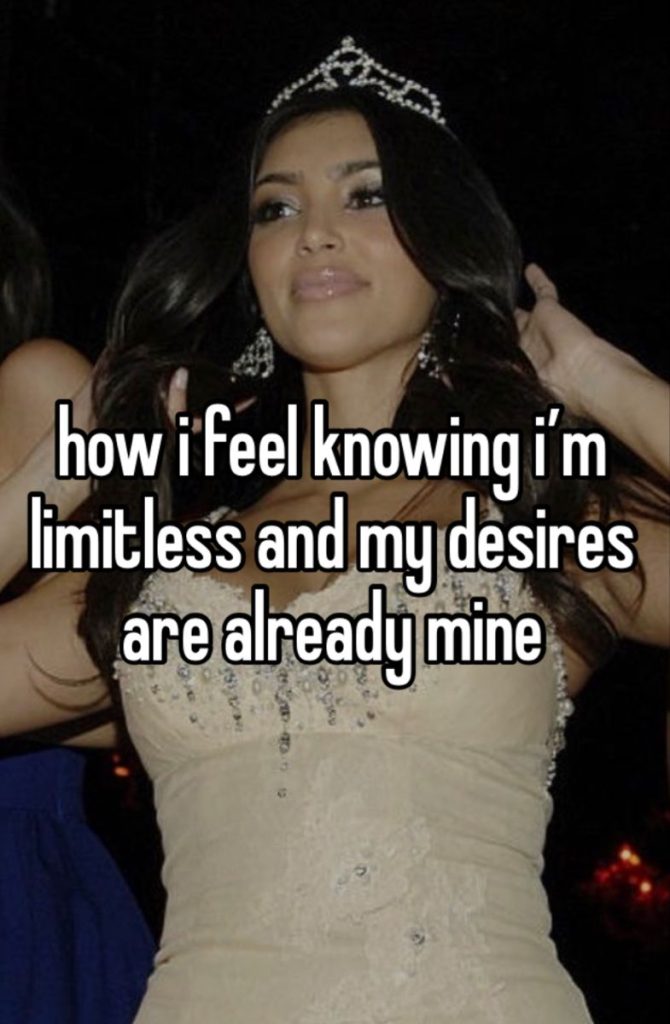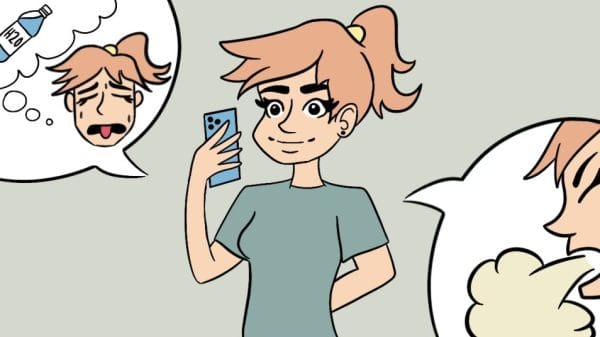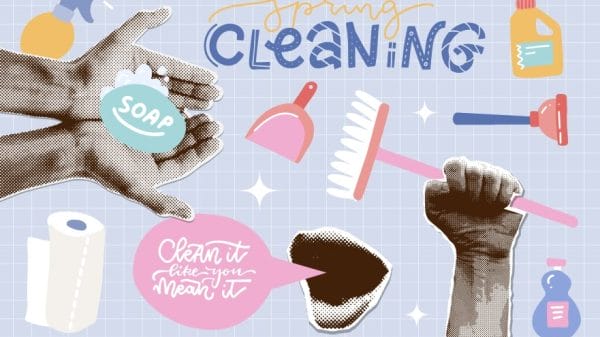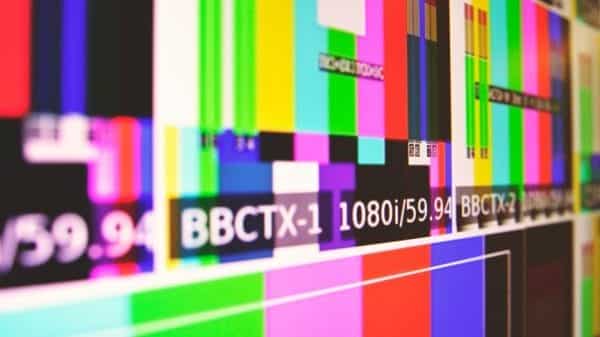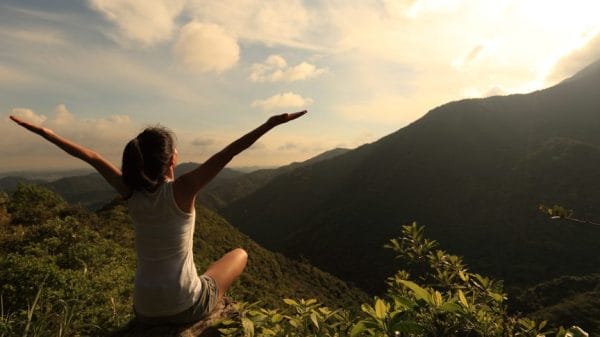Pinterest, often dubbed the least problematic social media platform, is most known for its aesthetically pleasing mood boards. In recent years, however, a trend combining the Law of Attraction philosophy with the commercial zeal of Girl Boss Feminism, has emerged in the app, encouraging a new wave of young women to try their hand at manifesting: wealth, beauty, everything a girl could want, right?
The belief that positive mental patterns can ‘manifest’ themselves into the desired reality was arguably pioneered by female thinkers. Rhonda Byrne’s self-help book ‘The Secret’ (2006), now inextricably tied to the concept of manifestation, sold as many as 30 million copies around the world. As well as this, the Abraham Hicks organization, calling itself the ‘source’ behind the Law of Attraction, was founded by the motivational speaker Esther Hicks, who to this day, offers paid courses to ‘educate’ thousands of her religiously devoted followers.
What they teach about the Law of Attraction is that anything, including wealth and power, can be achieved through thought alone. And, if a person’s mental reality doesn’t align with their physical one (also known as the ‘3D’), then supposedly it means they haven’t ‘manifested’ hard enough. But what does this have to do with Pinterest? Well, if you’re looking for motivation, a quick scroll through the app may lead you to discover the world of manifestation like it’s never been seen before: in pink.

Pin it to win it
It almost seems obvious that Pinterest would be the chosen tool for the manifestation community, considering the app itself functions on its users ‘claiming’ ideas for self-improvement. For instance, a user may aspirationally ‘pin’ an image of an outfit they like, as though to replicate the feeling of owning it. Or, if they’re into cooking, they may ‘pin’ a recipe that they could very possibly taste themselves one day.
On the consumerism side of things, Pinterest is also an incredible spending enabler. Its clever marketing technique allows users to purchase items, such as clothing or jewelry, without ever leaving the app. And thus, by encouraging its users to cultivate their various material wants into neat boards, the platform has arguably become an accidental breeding ground for modern Capitalist ideology:
“I see it, I like it, I want it, I got it”
Ariana grande, ‘7 rings’
An example of this can be found in a more recent trend, where users upload images made through the app Whisper, and, applying their philosophy a la Byrne and Hicks, give their material desires a snappy, aesthetically-pleasing flair. Intriguingly, the majority of these images associate the practice of manifestation with a revered idol or celebrity (representing the desired beauty standard) such as this one featuring a young Kim K:
Pinterest is a girl’s best friend
Considering more than 70% of Pinterest’s users are female, and the fact that these manifestation posts have such an explicitly feminine design, it’s easy to interpret the trend as a reflection of the desires and dissatisfaction of a whole generation of young women. However, arguably, the app itself is not entirely to blame, as wealth and beauty are almost universally seen as measures of success in our unstable modern times.
While positive thinking is just that, a positive thing, the obsession with achieving the perfect look and a bank account to match it, seems to highlight, more than anything, a lack of access to such things for the average person. Consequently, behind the facade of unapologetic confidence and optimism, arguably, the trend reveals a looming sense of inner deprivation and unworthiness. How can a regular girl be content when her favorite celebrity has managed to ‘manifest’ a life of glamour and riches?
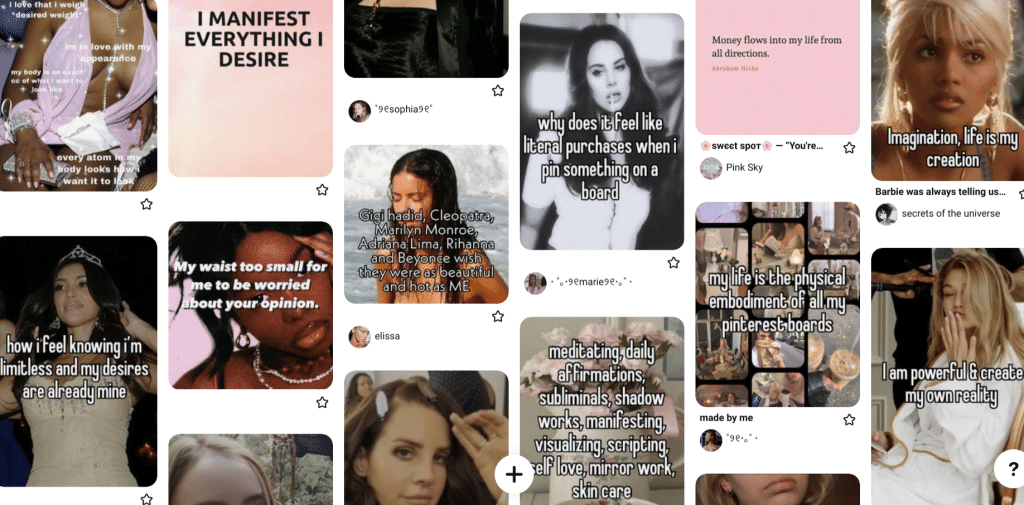
Claim it or kill it?
The harsh truth, however, is that wealth and beauty rarely ‘manifest’ out of thin air: the majority of celebrities were born into privilege, simply won the genetic lottery, and/or were able to afford aesthetic surgery. Knowing that it is not uncommon for social media to exacerbate issues of body image and insecurity in young girls, why then would we encourage them to change, when we could instead combat the delusions brewing within these platforms?



